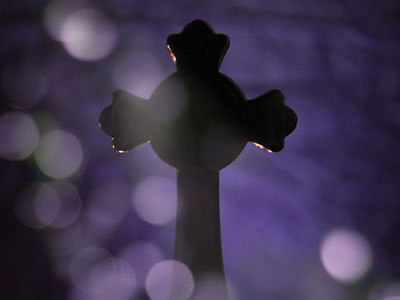
Fourth Sunday of Lent - Saying, Doing, or Being?
03-10-2024Gospel ReflectionTom SchmidtSt. Paul tells us in his letter to the Ephesians that we are saved through grace: God’s actions of sending his Son to die for us, and raising Jesus from the dead show the love God has for us. It comes entirely from God. We are saved by our faith in Jesus, but even that faith comes from God. So when Paul says that no one can boast about being saved, he means that we can’t add up our good deeds like reward points for heaven. He also means that we can’t brag about our faith because we can recite the creed or answer an altar call. So if being saved is not a matter of saying the right things, or doing good deeds, what is it?
The answer comes from the gospel. Jesus tells us that he will be lifted up, or crucified, so that we can believe in him and have eternal life. Notice he doesn’t give a list of facts about God that we are required to believe. When we “believe in” someone, we put our love and trust in that person. We want to be with that person as much as we can. We know that we are loved and so respond by giving love. Our response of love is not just a happy feeling. It inspires us to stop being selfish and start noticing that others need our help. Jesus describes it as living in the light: we are not ashamed to help someone, forgive someone, or comfort someone. While we do not force our faith on others, we don’t hide it either. Our life is in the light, open to anyone who wants to see what God has done for us.
That brings us back to the question about salvation: it is not something we do or say. It is what God does for us. Our response of faith is also his gift. So when we recognize all that God has done for us and believe in his Son Jesus, the Spirit will guide us to live that faith and share it with others.
Cuarto domingo de Cuaresma - ¿Decir, hacer o ser?
San Pablo nos dice en su carta a los Efesios que somos salvados a través de la gracia. Las acciones de Dios de enviar a su Hijo a morir por nosotros y resucitar a Jesús de entre los muertos muestran el amor que Dios tiene por nosotros. Proviene enteramente de Dios. Somos salvados por nuestra fe en Jesús, pero incluso esa fe viene de Dios. Así que, cuando Pablo dice que nadie puede presumir sobre ser salvado, quiere decir que no podemos sumar las buenas obras como puntos de recompensa para el cielo. También quiere decir que no podemos presumir de nuestra fe porque podemos recitar el credo o irnos al altar cuando nos inviten. Entonces, si ser salvado no es cuestión de decir las cosas correctas o hacer buenas obras, ¿qué es?
La respuesta viene del evangelio. Jesús nos dice que será levantado, o crucificado, para que podamos creer en él y obtener la vida eterna. Ten en cuenta que no da una lista de hechos acerca de Dios que debemos creer. Cuando “creemos en” alguien, ponemos nuestro amor y confianza en esa persona. Queremos estar con esa persona lo más posible. Sabemos que somos amados y por eso respondemos dando amor. Nuestra respuesta de amor no es sólo un sentimiento de felicidad. Nos inspira a dejar de ser egoístas y empezar a darnos cuenta de que los demás necesitan nuestra ayuda. Jesús lo describe como vivir en la luz: no nos avergonzamos de ayudar a alguien, perdonar a alguien o consolar a alguien. Si bien no imponemos nuestra fe a los demás, tampoco la ocultamos. Nuestra vida está en la luz, abierta a cualquiera que quiera ver lo que Dios ha hecho por nosotros.
Eso nos lleva de nuevo a la pregunta sobre la salvación: no es algo que hacemos o decimos. Es lo que Dios hace por nosotros. Nuestra respuesta de fe también es su don. Entonces, cuando reconocemos todo lo que Dios ha hecho por nosotros y creemos en su Hijo Jesús, el Espíritu nos guiará a vivir esa fe y compartirla con los demás.
BACK TO LIST